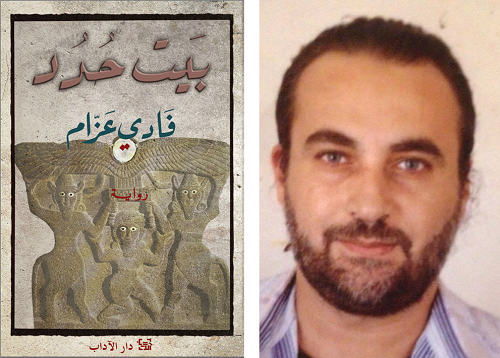Interview with longlisted author Fadi Azzam
14/02/2018

When did you begin writing Huddud's House and where did the inspiration for it come from?
I started working on it in 2012. I don’t believe there is inspiration for writing prose, and if there is then I don’t know how it works. But in my experience in writing Huddud's House, it was serious, hard work, pervaded with a secret bliss that I call the excitement of writing before getting published.

Did the novel take long to write and where were you when you finished it?
I wrote the scene that I started the novel with in Dubai in 2012, where I lived for 13 years. I had read, archived and worked on a big number of research projects, particularly in the fields of medicine, history and crime, as well as following up daily on the changing and tense reality in Syria, which makes up the world of the novel itself.
No piece of information has been included without reference and after that my imagination began to build a world with different roles. Events unfolded in parallel, many sections in the novel appeared and I didn’t know where they would take place or what they would mean. Only an intuition would lead me to a vague idea, and as the writing went on, things became clearer. The outline and the names of the characters changed a lot over the course of three years of work in Dubai. But I didn’t dedicate all of my time to the work until I came to Britain, during which I worked on it for 14 to 16 hours a day. And then an unexpected dilemma happened. In the northern town of Middlesbrough, I went to the neighborhood library to return some books and check out new ones, returning 15 minutes later to find that thieves had broken into my house and stolen my computer and mobile phone.
I had reached chapter 27 and I discovered that I’d saved only 14 chapters in my email.
I stopped writing. It was a truly painful and difficult feeling. I could no longer write in that town, or even sleep there. I could not retrieve the momentum for those lost chapters. I left for London and stayed in Kilburn, in an amazing room, and I was able to write full time once again. I made up for what I lost as much as I could. Sometimes I would work for more than 16 hours. For about a year, I wrote five days a week and worked the other two in order to earn a living. Once I was finished I found that the draft was over 1,000 pages.
I rewrote it more than nine times before it ended up in its current form. The funny thing is that the first draft which was the seed for this novel no longer exists in the novel as it is today.
How did readers and critics receive it?
While I thank those who noticed and read Huddud's House, and considered it an interesting work that deserved their attention, most critics and journalists treated it with indifference. But this improved after it made it to the longlist, and this is one of the advantages of the Prize.
I was surprised to find that some of the readings by the public were more cruel, powerful and profound than reviews in prestigious papers.
What is your next literary project after this novel?
I am working on a novel where music is an integral element. A fearless work, which is something that I wish I didn’t have to worry about when looking for a publisher. But being Syrian these days, I don’t have the luxury of writing about anything other than the geographic pain that I belong to.
How, when my name is on the longlist next to Syria, can I do anything but write for this pained, proud and kind country? I have no personal literary project, at least as long as Syrian blood continues to be shed so profusely. I do not have that luxury.
